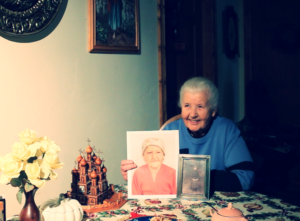Story by Krista Schilling, American Red Cross Regional International Services Program Manager, Seattle, Washington
Marta Kruk Lysnewycz was born in Hai, in the Chernigovskaya region of Ukraine in 1926. After surviving Stalin’s genocide of the Ukrainian people known as Holodomor or “death by starvation” during 1932 and 1933, Marta was taken to a forced labor camp in Hitler’s Germany when she was 17 years old. She lost all contact with her mother and nine siblings.

While in forced labor in Germany, she married a Ukrainian partisan. Because of his political activities during World War II in support of Ukraine’s freedom from Soviet rule, Marta was unable to look for her family after the war. For decades, she didn’t know what happened to her family and was too afraid of the Soviets to start a search.
In 2013, Marta’s daughter Christine Lysnewycz Holbert saw an online ad in their current home of Sandpoint, Idaho, for SeniorWish.org. Christine wrote to them about her mother’s turbulent early life in war-torn Ukraine and Germany and inquired if they could help find information about what happened to Marta’s family during and after WWII. They were intrigued by Marta’s story and started the process of trying to discover if any of Marta’s siblings were still alive.
Marta was the second to youngest child in the Kruk family, so the search began as a quest for information about her younger sister, Maria, who, because of her younger age, might still be alive. Rampant corruption and limited access to crucial records left Marta and her daughter doubtful any information would be found. After many false starts and demands for bribes in exchange for information, SeniorWish finally decided it was not possible for them to find Marta’s family. They suggested contacting the Red Cross. Marta agreed.
SeniorWish contacted the American Red Cross Restoring Family Links program on Marta’s behalf to help locate Maria. Ultimately, the Red Cross found records revealing that Maria, born in 1930, had passed away in 2008. After so many years of not knowing the fate of her sister, the news gave closure for Marta and her family.
The Red Cross also discovered the birth and death certificates for Marta’s other brothers and sisters, giving Marta and her family more information than they ever hoped to receive. They were grateful to have knowledge about Marta’s Ukrainian birth family, especially that her mother had survived into her 80s. Marta was grateful for the news about her mother and siblings, and thought this was the end of the story.
However, unbeknownst to Marta, the Red Cross search continued. A couple of years after the initial search was started, the Red Cross revealed a surprise. From her large family of ten siblings, Marta’s older sister, Vassia, was still living in a remote Ukranian village. During the conflict, Vassia had been taken to a forced labor and thought to have been killed. Now at 92 years old, she lived alone and had no phone.
With assistance from the Red Cross, the sisters reconnected after 72 years apart. Marta received a letter from Vassia and several photos. A Skype call was facilitated through the Red Cross.
Vassia knew the first question her sister Marta would ask: What happened to their mother? This was the single most important piece of news that Marta could have received.
“It gave her such relief to know that her mother was taken in and cared for, by her own sister, until she died of natural causes and old age,” said Christine.
The two sisters, at first so overwhelmed by the duration of their separation, hardly knew what to talk about. “But then they spoke, hesitantly, for about an hour,” Christine recounted. She added that her aging mother wanted to dress up for the occasion. “She had asked someone to lend her some fancier clothes to wear for the Skype call.”
The reunification of the Kruk sisters—taking into account the tragic circumstances of their separation and now, their advanced age and the distance between them—is an event that defied the odds. It also shines a light on the profound impact of the Red Cross Restoring Family Links program and its ability to go beyond borders, distance and historic events to bring loved ones together again.
If you or someone you know is looking for loved ones, the Red Cross may be able to help. You can visit our website for more information or fill out our form to begin your search today.
